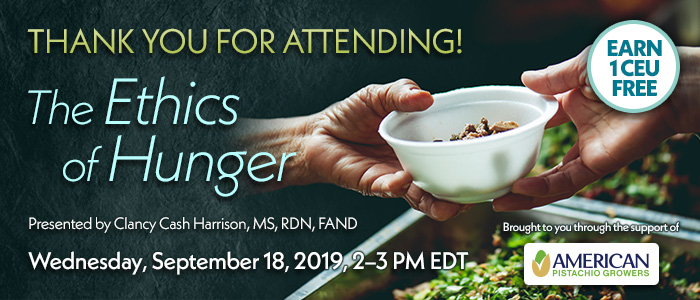Webinar: The Ethics of Hunger

Suggested CDR Learning Needs Codes: 1050, 1070, 4070, 6080
Suggested CDR Performance Indicators: 1.1.1, 1.1.8, 3.3.2, 7.2.3
CPE Level 2
CDR Activity Type 175
This webinar is pre-approved by the CDR for 1 ethics credit.
This webinar took place on Wednesday, September 18, 2019 from 2-3 p.m. ET. Please check back soon for access to the recorded version.
Hunger is an ethical issue first — it isn't just a philanthropic or moral issue. Bringing assumptions and perceptions about a person's access to healthy food hurts our clients' health. If we don't ask the right questions about food insecurity we inadvertently encourage the stigma associated with food assistance; we contribute to the increase in 10 major chronic diseases and exacerbate existing chronic disease; and we perpetuate the cycle of poor food access.
In the second of this two-part series, Clancy Cash Harrison, MS, RDN, FAND, bridges the knowledge gap between the overall health of our clients and food insecurity. She dives deep into the ethics of the food insecurity epidemic, focusing on the symptoms, risk factors, and the costs of allowing food insecurity to go untreated. Clancy also discusses the important dynamic of patient care, sharing coping mechanisms, all-important techniques to screen patients with sensitivity, and how to use patient-centered language to reduce the stigma of food insecurity.
Learning Objectives
After completing this continuing education course, nutrition professionals will be able to:
- Explain the ethics of food insecurity as it relates to personal beliefs and the specialized role of nutrition and dietetics professionals.
- Distinguish individuals at risk for malnutrition related to food insecurity and explain the ethics behind nutrition education.
- Learn, understand and apply ethics when screening for food insecurity.
- List resources to improve food access and health outcomes.
 As a registered dietitian, TEDx speaker, and food justice advocate, Clancy Harrison, MS, RDN, FAND, challenges the way food insecurity is approached in the United States. Clancy is a consultant for organizations who want to shift their approach to nutrition education by making food access a priority for their clients. She is the President of the West Side Food Pantry and the founder of multiple grass-root anti-hunger programs. She also teaches at Pennsylvania State University. Clancy’s humor, humility, honesty, and practical strategies combined with her research-based expertise make her a highly sought-after speaker for national keynotes.
As a registered dietitian, TEDx speaker, and food justice advocate, Clancy Harrison, MS, RDN, FAND, challenges the way food insecurity is approached in the United States. Clancy is a consultant for organizations who want to shift their approach to nutrition education by making food access a priority for their clients. She is the President of the West Side Food Pantry and the founder of multiple grass-root anti-hunger programs. She also teaches at Pennsylvania State University. Clancy’s humor, humility, honesty, and practical strategies combined with her research-based expertise make her a highly sought-after speaker for national keynotes.
This complimentary 1-credit continuing education webinar is brought to you with support from American Pistachio Growers. Please note that American Pistachio Growers provided financial support only and did not have input into the information provided in this course. American Pistachio Growers (APG) is a non-profit trade association representing over 800 grower members in California, Arizona, and New Mexico. APG is governed by a democratically elected board of directors who are growers and is funded entirely by growers and independent processors with the shared goal of increasing global awareness of nutritious, American-grown pistachios. Clancy Cash Harrison, MS, RDN, FAND, has no relevant disclosures to report and has certified that no conflict of interest exists for this program. View our disclosure policy.
The Academy of Nutrition and Dietetics (Academy) and Commission on Dietetic Registration (CDR) are not responsible for the provider’s interpretation of the Academy/CDR Code of Ethics for the Nutrition and Dietetics Profession or its enforcement as it relates to the scenarios and content presented in this activity.
Available Credit
- 1.00 CDR
Price
Required Hardware/software
Ensure your browser's cookies are enabled in order for the GoToWebcast software to function properly.

 Facebook
Facebook X
X LinkedIn
LinkedIn Forward
Forward